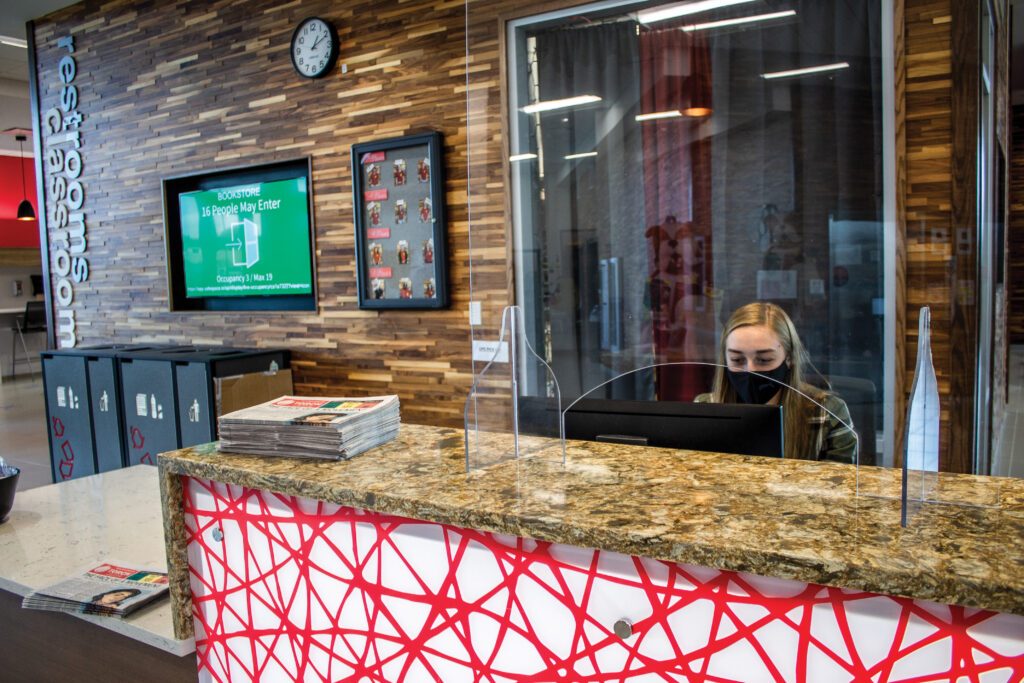Ferris has currently has 33 active COVID-19 cases and students in dorms are wondering what it would look like if they needed to go into quarantine or isolation on campus.

While they may sound similar, quarantine and isolation are two different procedures. Isolation is the separation of sick people with a contagious disease from those who are not sick, while quarantine refers to separating and restricting the movement of people who are exposed to a contagious disease to see if they become sick, according to the Center for Disease Control.
Students who test positive for COVID-19 at Ferris are being isolated in a residence hall that is specifically reserved for these students. From here the students are provided with different services such as meal delivery, garbage disposal and laundry services, says Director of residential programs and services and associate director of housing, Lisa Ortiz.
However, each case is managed on a case-by-case basis by housing, the Birkam Health Center and the local health department to assess every student’s situation. Students are also offered the opportunity to quarantine or self-isolate in their own dorm room and be provided with the same services.
One of the first steps that a student should take when feeling symptomatic, coming into contact with a positive case or receiving a positive test themselves is to contact the Birkam Health Center to be provided with more information and see whether quarantining or isolation would be the best move.
There is currently no system set in place to track whether students are staying in their room and properly quarantining or staying isolated.
“Students are responsible for understanding the importance of staying in both quarantine and isolation,” Ortiz said.
Television and media production sophomore Matthew Dominguez-Sandoval contracted COVID-19 in back in April and is hoping that students are taking the proper steps to quarantine or isolate and actually staying in their rooms as he did.
Dominguez-Sandoval who is currently living in a dorm has mixed feelings as to what would happen if he had to isolate himself again.
“I was in my own home so I felt more comfortable,” Dominguez-Sandoval said. “I had a support system and different resources, but I think that having to quarantine or isolate in a dorm room would be so different and it would definitely take a toll on your mental health. I don’t know if I would have the same support here, as I did before and I’m sure it would make you feel very lonely.”
Dominguez-Sandoval also recalls his first experience with isolating to be one that was very boring.
“No matter what, I think you’re going to get bored; there’s no way around it,” Dominguez-Sandoval said. “Every day started to feel the same, I would get up, eat, play video games and sleep. And as much as I love playing Modern Warfare, it can get boring real quick.”
Aside from the potential boredom one may face, a big concern that even made nationwide news is how students are receiving meals.
New York University (NYU) was one of the schools that made headlines when students who were quarantining, posted videos on the social media platform, Tik Tok, of the meals that they were receiving.
NYU set into place a 14-day quarantine for all students who were living in the residence halls that moved from outside of the Tri-State area at the beginning of the semester. Each of these students received meal deliveries three times a day, however, many students had shown in these videos that at times the university would forget to deliver meals or even deliver meals that did not cater to the dietary restrictions of the student, such as giving meat to students who were vegan.
“I’ve seen the horror stories on Tik Tok from students at other universities so, I hope that it’s nothing like that here at Ferris. It’s bad enough that your basically locked in your room for 14 days with not much to do, so it would just make it worse if the food was bad too,” Dominguez-Sandoval said.
So far, this has not been the case at Ferris and there haven’t been reports by students who are isolating or quarantining in the dorms. All the meals that are being provided come from the dining services. Students inform dining services if they want breakfast, lunch and dinner and meals are then delivered to each housing location and then taken to the rooms by whoever is working at the front desk. The meal arrives in a white bag and the worker places the meal outside of the room, knocks and leaves to prevent direct contact with the student.
Students are recommended to keep a “Go Bag” packed in case there is a sudden need to move into an isolation room in one of the reserved residence halls.
More information about any updates or changes can be found at ferris.edu/coronavirus or ferris.edu/housing. Students can also contact housing with any questions through email at housing@nullferris.edu.
